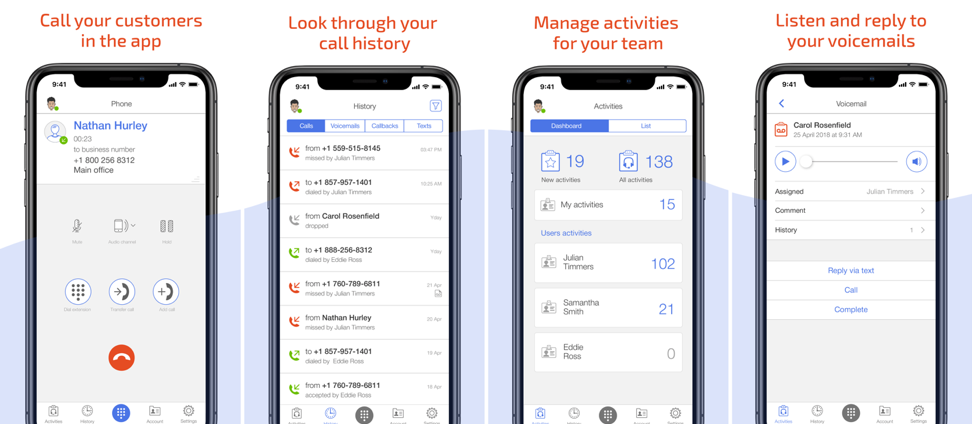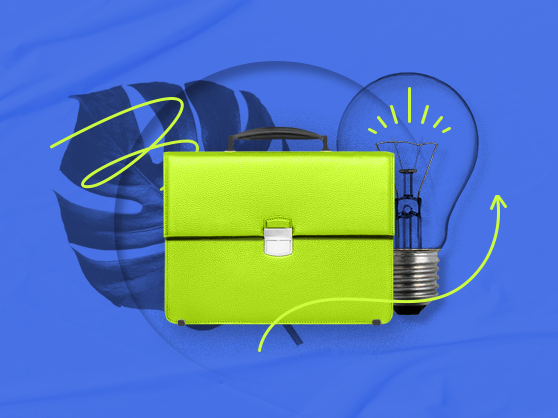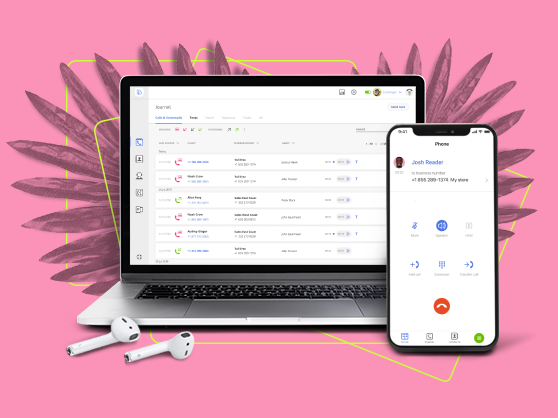Digital trends are everywhere. Catch up on business news, pop in for a chat with a colleague, or visit an online digital trends summit, and you may feel the omnipotent digital trends wave (if not tsunami) knock you straight off your feet with terms like AI, IoT, VoIP, and PoS.
If you’re in small business, you’ve heard lots about the perks of digital transformation for small business: the client growth, the savings, the customer satisfaction stats. But as the tech lingo grows denser and more innovative by the year, some of us get a pang of nostalgia for the good old days when software was a tad simpler.
In this light, digital transformation and latest tech trends, however great they sound, may feel overwhelming. Questions like “where do I start”, “should I go for paid or free tools”, “how well will my team adapt (and how quickly)”, are often enough to cool down the initial hype of modernization for smaller teams.
In reality, getting caught up with digital trends can be exciting and simple when you have a clear understanding of what to look for.
Even if you feel like a Silicon Valley outsider when the conversation turns tech, this simple pocket dictionary will unveil the tools that can help any small business go digital– at individual pace.
Scroll down to demystify!
![]()
Automation
What is it? Digital transformation for small business involves lots and lots of automation. Automation makes just about anything good even better by taking over the tasks you do manually and making them run on autopilot. Automation can be applied pretty much to any business process, data analysis, sales and marketing task you can think of.
Why you need it: If words like “process orchestration” and “decision algorithms” aren’t your piece of cake, automating marketing and e-mail tasks has never hurt any small business. Marketing automation will help you generate leads, cut back on costs, and get a better hang of your business with boosted time-management.
Try this! ActiveCampaign for spot-on marketing automation. Plans start a $9/mo and include email segmentation, newsletters, site tracking, event tracking, contact and lead scoring, and more.
![]()
Bot
What is it? A bot or chatbot is a smart online assistant that uses Artificial Intelligence (AI) -powered chat to answer inquiries. To a site visitor, a chat with a bot feels similar to how a chat with tech support would go. Behind the scenes though, the information is automated. Depending on the type of bot used, it can help small business with anything from FAQ to organizing daily errands.
Why you need it: With 73% customer satisfaction rates, there’s no reason not to get a chatbot for your website. Business owners will find that a bot can replace an employee dedicated to general customer inquiries (or free you of those obligations) and manage help desk/support questions. Chatbots are especially useful for online business.
Try this! Bot newbies — try out Chyme. It integrates with any messenger and voice assistant like Facebook Messenger, Slack, Amazon Alexa, etc. and introduces you to the many of ways of using bots to optimize small business tasks and manage personal time.
![]()
CRM
What is it? Though any digital tool used for customer service optimization may be called CRM, Customer Relationship Management (CRM) is best defined as a suite of customer service, sales, marketing, and analytics products. These tools help businesses use any and all of their customer data to generate new leads and increase ROI.
Why you need it: As a small business, you have loads of customer data that can be turned into a full-blown small business digital transformation strategy. A CRM system is like a personal business analyst turned digital: it will organize important information for you so you can start generating leads from every interaction with customers, as simple as a phone call or email.
Try this! For those who’re just starting out with analytics, HubSpot may help you quickly adapt to the learning curve of customer relationship management platforms. With a free package to try out the system or use permanently, HubSpot is a frequent choice over Salesforce for solopreneurs, home-based, and small business.
![]()
Gateway
What is it? Payment Gateways process online payments for e-commerce. Wherever you ship products or supply services, a reliable payment gateway makes it safe for customers to buy your products/services online, and simple for you to receive payments.
Why you need it: Online stores, freelancers, and anyone who does business transactions online must have a convenient and reliable system for receiving payments via the internet.
Try this! For safety and reliability, stick to the big names in the market like Stripe and PayPal. If your online business is limited to North America, Stripe offers a wider array of payment types. If you’re a global business though, keep in mind that PayPal is still unrivaled in geographic coverage and is accepted in over 200 countries (Stripe is currently limited to 25). Both services charge similar fees per transaction.
![]()
Integration
What is it? Integration means the connection or merge of two or more digital technologies (apps/tools). By integrating two or more services, you can automatically receive information from those platforms in one place. This ensures a unified workflow and leads to incredibly more productive output.
Why you need it: When choosing digital tools, think not in ones but in pairs. This way, you’ll avoid one of the most frequent pitfalls for small business going digital: lots of disconnected apps. Today, many products offer built-in integration, so if you’re just starting out with digital trends, research how well your chosen tools integrate with each other.
Try this! If your existing digital tools aren’t big on integration or you need a fast alternative to connect them, Zapier is a must-have. With its ability to integrate over 1,500 apps and a free starter pack, it will take your mind off manually checking information from different platforms, doing similar tasks on repeat, or the fear of missing important messages.
IoT
What is it? IoT is a huge game-changer these days. Even if you aren’t familiar with the definition, you’ve already used it when doing things like syncing your mobile devices. The Internet of Things (IoT) is a concept of connecting multiple devices (“things”) to the internet and to each other. In fact, IoT is like integration taken a step further – from software to everyday devices like mobile devices, TVs, and wearables.
Why you need it: To simplify everyday life and make various devices “click”. According to Statista, in 2015 there were 15 billion connected devices installed worldwide. In 2019, that number topped 26 billion. While the world is speedily coming to terms with its craving for digital trends and transformation, keep in mind that privacy is still a work in progress for many IoT gadgets.
Try this! If Google is your information life-line and you like cool gadgets, you’ll love Google Home Mini. It’s a mini smart speaker with a voice-powered Google Assistant built-in. Ask Google Home Mini for information, schedule and keep track of meetings or appointments, and play music/audiobooks/shows without the touch of a button!
![]()
Outsourcing
What is it? Outsourcing means delegating certain business or financial tasks over to another company that is a pro in the field. Even if you can do the job yourself, outsourcing allows you to free up time and concentrate on the essential tasks only you can do while handing important but secondary tasks over to hired professionals.
Why you need it: Bookkeeping, payroll, and financial services are some of the most popular outsourcing targets for small business. They can take care of your finances on a basic level or provide a dedicated finance team to make your personal finances transparent and empower business ROI. It all depends on your needs and budget!
Try this! Services like Indinero provide business owners with both the software to oversee their accounting and the expertise of a professional finance team that’s always at your beck and call.
![]()
PoS
What is it? Point of Sale, or PoS Systems, are used for receiving payments in physical retail stores. Unlike old-school cash registers, these systems are fast, mobile and automatically combine transactions with sales, inventory, and employee management.
Why you need it: Cloud-based PoS systems require very little hardware. All you need to complete transactions is an IPad/tablet, barcode scanner, credit card reader and receipt printer, plus cash drawer for cash payments. Some PoS systems allow you to turn even your mobile phone into a transaction device for accepting card payments!
Try this! Square is an ultra-cool PoS system of the future. For a quick payment solution, merchants may simply attach the small square dongle to a mobile phone to transform it into a card reader! This and other digital tools by Square are all available for a 2.75% commission per swipe.
![]()
SaaS
What is it? Nearly gone are the days when software was distributed via CD-ROMs. Software as a Service (SaaS), or Cloud tools have become a convenient and reliable alternative. With SaaS tools, business owners don’t need any hardware or extra tools to get up to date with digital trends, even if their team works remotely.
Why you need it: Wherever your team is located, all colleagues with internet connection can access and use digital SaaS tools acquired by your company. SaaS tools also ensure that your privacy is kept updated – as all information is stored in the cloud and security is constantly upgraded, you don’t run the risk of hacked servers which are an active threat to small business.
Try this! From accounting to marketing, sales, and management, here are the SaaS digital tools to try out without paying a penny.
![]()
Task manager
What is it? Task management software helps you visualize and get a better hang of pressing projects and tasks. One of the most popular task management tools is a Kanban-type visual board. Kanban is an Agile visual methodology for developing important projects assignments and tasks. It’s comprised of a visual board for your project that’s divided into workflow steps to complete and specific tasks for each step. Kanban apps and digital tools take the same idea and make it digital.
Why you need it: Task-management apps are great for teams, especially distributed teams. They let colleagues work on a project from anywhere, all the while sticking to a single place to keep track of progress, delegate tasks, and keep delivery on schedule. For solopreneurs, task management apps will solve the eternal problem of multi-tasking and make the most of your time.
Try this! MeisterTask is one of the many Kanban-inspired task management tools that makes implementing an idea from conception to delivery fun and simple. It’s available both in the desktop and mobile versions.
![]()
VoIP
What is it? If you’d get just one digital business tool to take on a (Wi-Fi-powered) desert island, this would be it. Voice over IP (VoIP), or as it’s often called, Virtual Telephony, is basically a whole telephone system in the cloud. All you need to set up a business VoIP system is a cell phone and internet connection. It’s so reliable and cost-effective, some of the most demanding industries such as clinics and hospitals are making the wide-scale switch to VoIP.

Why you need it: VoIP empowers small business with professional phone features that would cost a big deal were they to come from a PSTN landline provider. This includes unlimited extensions on local and toll-free numbers, visual call flows and call queues, auto-attendant, contact book, mobile app, and much more – all at up to 60% off landline pricing.
Try this! MightyCall brings the latest digital trends in communications to your team’s fingertips. Our virtual phone system service integrates with softphones, mobile phones, and IP phones, so you can talk business on all your devices (desktop, smartphone, and desk phone). Over three dozen impressive features are designed for small business and inspired by our customers’ needs and feedback!

MightyCall VoIP, mobile version
![]()
Widget
What is it? Web widgets are the small helpers on your website that simplify the customer experience. Unlike email or messengers that “typically reply within a day”, click-to-call and callback widgets allow customers to call a business right from its website (via a virtual phone pad) or order a callback (instant or scheduled). To install a calling widget, the user needs no coding skills.
Why you need it: Today’s customers don’t tolerate customer service glitches. According to research, it’s the poor reviews that get the most word of mouth, with the average American telling 15 people about a bad service experience. But there’s also good news: 67% of customer churn is preventable if an issue is promptly addressed.
Try this! Calling widgets come with all MightyCall plans. All missed and accepted calls coming via MightyCall’s service (including calls from web widgets) are visible in the user’s and their team’s Dashboard. As a result, keeping clients happy and having a 360-degree view of communications at any given hour is ridiculously easy.
Final word
When you know exactly what to do, it becomes really clear how to do it! To begin digital transformation for small business, start with defining the pros and cons of your current business situation and addressing issues such as churn, customer feedback, and team motivation.
At the end of the day, you’ll find that those digital trends and acronyms aren’t all about the technology — they’re about a flexible, open mindset that keeps transforming your small business into the very best version of itself!





























